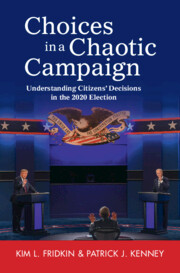Book contents
- Choices in a Chaotic Campaign
- Choices in a Chaotic Campaign
- Copyright page
- Dedication
- Contents
- Figures
- Tables
- Preface
- 1 Understanding How Campaigns Matter
- 2 “A Hot Mess inside a Dumpster Fire inside a Train Wreck”
- 3 The Priming of COVID-19 during the Campaign
- 4 Protests against Police Brutality
- 5 “A Rigged Election”
- 6 How the Campaign Shapes Voters’ Decisions about the Candidates
- 7 The Impact of Campaign Messages on the Decision to Vote
- 8 How Campaign 2020 Matters
- Appendix Survey Questionnaire
- References
- Index
8 - How Campaign 2020 Matters
Published online by Cambridge University Press: 16 May 2024
- Choices in a Chaotic Campaign
- Choices in a Chaotic Campaign
- Copyright page
- Dedication
- Contents
- Figures
- Tables
- Preface
- 1 Understanding How Campaigns Matter
- 2 “A Hot Mess inside a Dumpster Fire inside a Train Wreck”
- 3 The Priming of COVID-19 during the Campaign
- 4 Protests against Police Brutality
- 5 “A Rigged Election”
- 6 How the Campaign Shapes Voters’ Decisions about the Candidates
- 7 The Impact of Campaign Messages on the Decision to Vote
- 8 How Campaign 2020 Matters
- Appendix Survey Questionnaire
- References
- Index
Summary
In this chapter, we highlight the impressive evidence for the citizen-centered theory of campaigns. We find that psychological predispositions do not simply reinforce partisan orientation. Instead, these predispositions tap distinct characteristics, influencing how people view the events and issues of the campaign. We also make suggestions about how to study campaigns in the future. While the electoral context of 2020 highlighted particular psychological predispositions, future elections are likely to put a premium on alternative psychological predispositions (e.g., benevolent racism, need for affect). We encourage researchers to be more exhaustive, systematic, and consistent in exploring the impact of people’s psychological predispositions during campaigns. We also review and speculate about how candidates’ campaign strategies may have helped shape the outcome, especially when we consider the razor thin vote margins in a few key states. Specifically, it appears Trump’s actions worked to his detriment both in who voted and in who people supported. Finally, given the events and rhetoric associated with the 2020 campaign, we conclude by assessing the health of our representative system of government where elections play a vital role.
Keywords
Information
- Type
- Chapter
- Information
- Choices in a Chaotic CampaignUnderstanding Citizens' Decisions in the 2020 Election, pp. 193 - 210Publisher: Cambridge University PressPrint publication year: 2024
